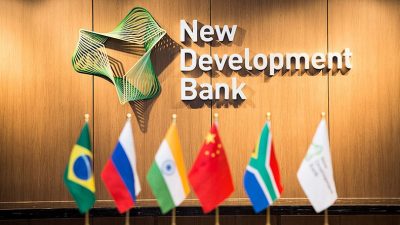Saudi Arabia Set to Join BRICS’ New Development Bank

All Global Research articles can be read in 51 languages by activating the Translate Website button below the author’s name.
To receive Global Research’s Daily Newsletter (selected articles), click here.
Click the share button above to email/forward this article to your friends and colleagues. Follow us on Instagram and Twitter and subscribe to our Telegram Channel. Feel free to repost and share widely Global Research articles.
***
The strengthening of ties between the BRICS bank and Saudi Arabia, the world’s second-largest oil producer, is undesirable for the West as it again signals another advancement in the de-dollarisation of the global economy. In the last week of May, Saudi Arabia held talks to join BRICS’ New Development Bank as its ninth member, a decision that is not only economic but also with political motive.
Saudi Arabia’s benefit from joining the NDB is clear, given the potential for increased trade, especially Saudi exports. The Kingdom of Saudi Arabia is one of the world’s largest oil suppliers, and BRICS countries produce many different goods. Therefore, such cooperation can be considered mutually beneficial. Saudi membership in the NDB will expand the internal market of the BRICS countries, which means opening new opportunities for economic development in these countries.
As Bloomberg reported on May 30:
“The New Development Bank, the lender created by the BRICS group of nations, will widen its membership as it seeks to boost its capital and counter the influence of Western-dominated multilateral banks.”
Saudi Arabia is the biggest economy in the region, and its neighbour, the United Arab Emirates (UAE), is already a member of the NDB. At the same time, Saudi Arabia has also expressed interest in joining BRICS. The BRICS summit in South Africa in August will discuss expanding the grouping, which could open the path for the Arab country to join.
“In the Middle East, we attach great importance to the Kingdom of Saudi Arabia and are currently engaged in a qualified dialogue with them,” the NDB told the Financial Times in a statement.
Talks with Saudi Arabia come as the NDB prepares to formally evaluate its funding options, which were questioned after the West imposed sanctions on Russia following the launch of its special military operation in Ukraine.
Membership will likely be granted as it would strengthen Saudi Arabia’s bonds with BRICS countries, especially when the country is pursuing closer relations with all powers, particularly China. Chinese President Xi Jinping hailed a “new era” in the countries’ ties when he visited Saudi Arabia in 2022. Most importantly, Beijing in March brokered a historic agreement between Saudi Arabia and Iran to resume diplomatic relations, something which irked Washington.
The NDB has lent $33 billion to more than 96 projects in the five founding members — Brazil, Russia, India, China, and South Africa — but the bank has expanded its membership to include the United Arab Emirates, Egypt, and Bangladesh. Although Egypt and Bangladesh represent major emerging markets and economies, Saudi Arabia, like the UAE, would represent another rich shareholder in the NDB.
“[Fundraising options are] the most important thing at the moment,” said Ashwani Muthoo, director-general of the NDB’s independent evaluation office, which was established last year.
Muthoo declined to comment on the Saudi accession talks but said the board wanted to examine alternative instruments and currencies to bring in resources, something that Saudi Arabia can offer.
It is recalled that Mikhail Mishustin said on a visit to China in May that Moscow saw “one of the bank’s main goals” as defending the bloc from “illegitimate sanctions from the collective West”. This fact interests Saudi Arabia as it breaks from servitude to the US to become a sovereign Middle/Regional power instead.
It is recalled that China’s Foreign Ministry Spokesperson Wang Wenbin said in October 2022 that BRICS leaders agreed on expanding the bloc and expressed support for the discussion on the standards and procedures of expansion. Wang also noted that China would work with other BRICS members to jointly advance the expansion process so that more partners will join the BRICS family.
By being first accepted into the NDB, Saudi Arabia’s path to joining BRICS would be opened. As said, Saudi Arabia will likely join the NDB as the banks have a strong will to expand their membership, which will signal the Arab country’s eventual accession into the bloc.
Dilma Rousseff, the bank’s president, said at the NDB’s annual meeting in Shanghai on May 30, “The world is going through a transformation process and it’s not about one currency against any another one. NDB will continue seeking funds in the dollar market but also in the Asian market.”
The fact that the NDB is comprised of the most powerful and richest countries outside of the Western bloc has Washington concerned as it poses the greatest challenge to dollar hegemony. With the current level of the NDB project funding in local currencies at 22%, the bank is well on course to meet its goal of 30% by 2026. This percentage will only continue to grow as the years pass, and the addition of Saudi Arabia will contribute to this effort. Thus, the Middle Eastern country will actively participate in de-dollarisation.
*
Note to readers: Please click the share button above. Follow us on Instagram and Twitter and subscribe to our Telegram Channel. Feel free to repost and share widely Global Research articles.
Ahmed Adel is a Cairo-based geopolitics and political economy researcher.

